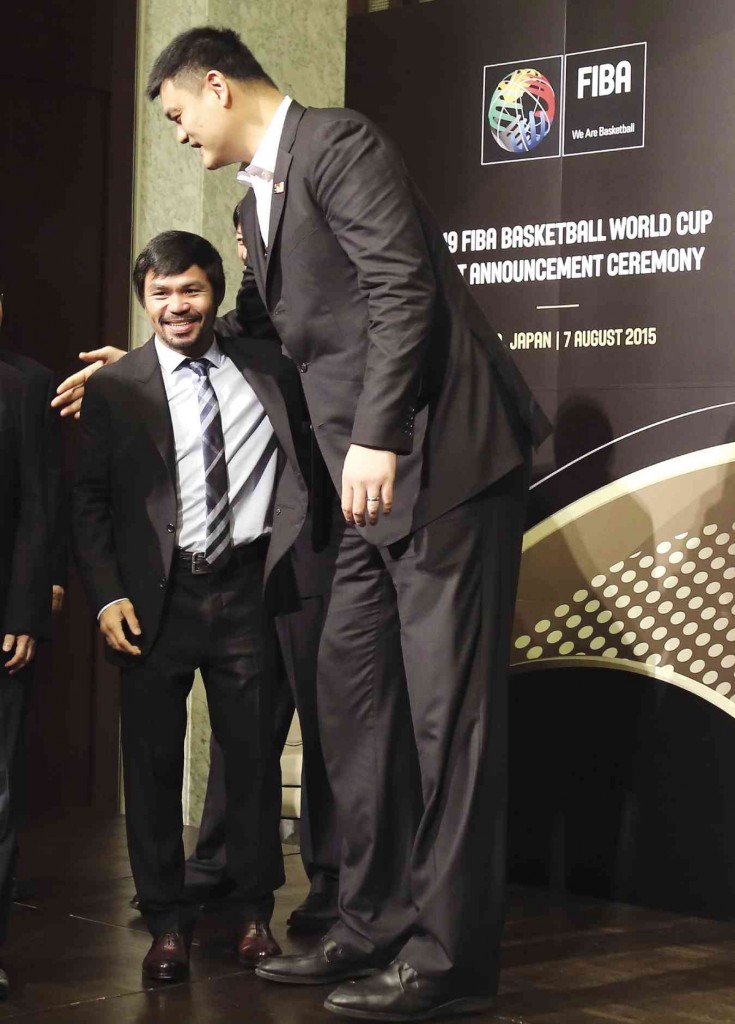
DAVID AND GOLIATH Eight-division world boxing champion Manny Pacquiao of the Philippines and China’s basketball superstar Yao Ming before the announcement of the 2019 Fiba Basketball World Cup host in Tokyo on Friday AP
There’s no coming home for basketball this time.
Pitching to host the 2019 Fiba World Cup using the emotions and passion of a basketball-crazy nation, the Philippines lost out in a “double overtime” decision to China on Friday night that had the Filipino delegation of top government officials, lawmakers, businessmen, sportsmen and a Hollywood celebrity leaving the venue in Tokyo with a broken heart.
“The host of the 2019 Fiba World Cup is …. China,” was the announcement made by Fiba president Horacio Muratore after pulling out what looked like a placard with the name of China from a huge envelope at the end of the Fiba Central Board meeting that lasted more than two hours.
READ: China outbids PH for 2019 Fiba Basketball World Cup hosting
China presented its final bid by hitting the Philippines where it is weakest—in infrastructure, economy and the experience in hosting events of such magnitude.
With China having a population of well more than a billion that guarantees a fixed market and venues and state-of-the-art transportation that are already in place, the voting seemed one-sided after former NBA superstar Yao Ming made the pitch for the Chinese before the deliberations.
Emotional presentation
Lou Diamond Phillips, the half-Filipino whose biggest claim to Hollywood fame was the success of the life story of the late Richie Valens in the movie “La Bamba,” made an emotional presentation to the Fiba board.
“[Basketball passion] is something you can’t manufacture, it’s authentic, it’s very real and it’s like nowhere else,” said Philips, clad, like the rest of the Philippine delegation, in a sharp-looking barong Tagalog that had a heart stitched on the left side of the chest.
Phillips and the rest of the team that included business tycoon Manny V. Pangilinan and boxing icon Manny Pacquiao almost succeeded in swaying the Central Board with the announcement taking a longer time in coming.
Good fight
The announcement of the decision was delayed twice, giving the impression that the Central Board had deliberated long and hard before its members agreed unanimously in choosing the eventual winner.
“I am still incredibly proud of this delegation. We fought a good fight and did everything we could,” said Phillips in a television interview a few minutes after Muratore made the announcement.
“I believe we have nothing to be ashamed of,” he continued. “I thought they (Central Board) were with us. I know that our message got through. I know it wasn’t an easy decision for them.”
Chot Reyes, the former Gilas Pilipinas national team head coach, said it was apparent that the Fiba board agonized over its final decision.
“It was like losing a game in double overtime,” said Reyes, who piloted the country to second place behind Iran in the Fiba Asia Championship two years ago in Manila and in the Fiba World Cup in Seville, Spain, last year.
READ: Sports personalities share sadness over lost Fiba bid
China will be holding the World Cup in eight cities—Beijing, Nanjing, Sozhou, Wuhan, Guangzhou, Shenzhen, Fosham and Dongguan.
While the Chinese have eight world-class stadiums already in place, the Philippines talked of three venues that are already operational—the Smart Araneta Coliseum, the Mall of Asia Arena and the 55,000-seat Philippine Arena—while saying that the fourth is just set to rise in Cebu.
China provided a video of a fluid transportation system, while the Philippine bid spoke of a billion-dollar infrastructure project that would link highways set to be completed before 2019.
READ: Infrastructure is key
Through Yao, the Chinese boasted of having hosted several big events in the past, including the 2008 Beijing Olympics, the 2010 Asian Games in Guangzhou, among others.
Big letdown
China will also host the 2022 Winter Olympics in Beijing.
As a show of sportsmanship, all the members of the Chinese delegation approached their counterparts from the Philippines after the announcement, with everyone shaking hands.
The decision was a big letdown for the Philippines and the star-studded delegation that prepared long and hard to make it as a finalist and how close they came to bagging the right to host the event for the first time since 1978.
France and Canada were among eight countries that initially signified intent to host the 2019 event.
It was the second setback that the Philippines took in bidding for the right to host a Fiba event. The first one also came in Japan in 2012 when Lebanon nosed out the Philippines for the Fiba-Asia right the following year.
The Philippines only went on to host that event when Lebanon, because of the crisis in war-torn Beirut, withdrew at the 11th hour, which actually gave Fiba a glimpse of how well the country could host a big event.
Losing the bid also narrowed down the chances of the country to play in the event itself, as the Filipinos will now have to go through a tedious qualifying schedule to make the 32-team field.
Had the Philippines won, it would have been seeded directly into the main draw.
The qualifying series will not be just a one-tournament scheme starting in 2017, with each country to play in home-and-away games in the region to determine the finalists.
RELATED STORIES
‘Sakit sa #PUSO2019’: Filipinos heartbroken over failed Fiba bid
Yao Ming: Philippines pushed us to the limit
Malacañang on Fiba bid loss: We put our best foot forward

